#eye movement desensitization and reprocessing
Explore tagged Tumblr posts
Text
The Science Behind EMDR Therapy: Eye Movements and Healing
Explores how eye movement desensitization and reprocessing EMDR therapy uses guided eye movements to help individuals reprocess traumatic memories. This video breaks down the science behind the therapy, explaining how it stimulates the brain’s natural healing process and promotes emotional recovery.
1 note
·
View note
Text
Why EMDR VR and Meditation heal you
We hope you enjoyed Why EMDR VR and Meditation heal you and follow the work closely to heal depression, anxiety, disorders and physical, mental and emotional pain of all variants. It can be extraordinarily life altering and fast too.
Why EMDR, VR and Meditation heal you is a question I often get asked. Many people are not convinced that anything beyond medicine or at the very least psychotherapy can heal you. I find the reason why EMDR, VR and Meditation heal you is because they take you beyond the analytical mind and out of the subconscious. EMDR (Eye Movement Desensitization and Reprocessing), VR (Virtual Reality), and…
#Center for Healing#Depression Clinics in South Africa#depression treatment centre#EMDR#Eye Movement Desensitization and Reprocessing#healing centre cape town#healing meditation#Healing Meditation Practice#healing trauma#lateral eye movement#mental health#mindfulness#Optic Movement#personality disorders#PTSD treatment#trauma#virtual reality#VR#wellness center
1 note
·
View note
Text
première séance d'EMDR demain matin. j'espère que ça va pas me rendre crazier than a shithouse rat
update: la séance a duré 2h30, j'en pouvais plus wesh. L'EMDR sera pour une prochaine rencontre. Il était assez sympa, un papa quoi. Il m'a pas fait payer. Il y avait bcp de blancs. J'ai pas vraiment osé lui parler de mes conso de drugs. J'ai failli pleurer au moins 10 fois mais je me suis retenue. Il pense clairement que j'suis maniaco dépressive aka bipolaire et que je devrais prendre des xanax histoire de calm the fuck down et d'arrêter de piccoler comme Narcissa Malefoy, cependant, il pense qu'il y a de l'espoir. Moi aussi, je le pense
0 notes
Text
Unlocking Healing Paths: The Transformative Power of EMDR for Stress Relief
In the realm of stress relief, EMDR stands as a beacon of hope, offering a unique and powerful approach to healing. Its ability to target the root causes of stress, reprocess traumatic memories, and promote adaptive responses positions it as a transformative therapy for individuals seeking relief from the burdens of modern life.
#emdr for stress#emdr psychotherapy#emdr therapy and bipolar disorder#eye movement therapy for anxiety#eye movement therapy for depression#eye movement desensitization and reprocessing#Dissociative Identity Disorder
0 notes
Text

Experience the Healing Power of EMDR Therapy for Trauma and PTSD
#emdr therapy#eye desensitization therapy#emdr eye movement therapy#eye movement desensitization reprocessing#eye movement desensitization therapy
0 notes
Text
Trauma is embedded within the body and ingrained in the brain. For lasting change, create strategies that address both the physical and mental aspects of trauma.
Physical Therapies:
Sensorimotor Psychotherapy: Leverages bodily sensations to navigate through trauma.
Yoga: Boosts bodily mindfulness and alleviates stress.
Somatic Experiencing: Helps discharge trauma-induced physical tension.
Tai Chi: Enhances equilibrium through deliberate movements.
Massage Therapy: Facilitates emotional liberation through easing muscle tightness.
Acupuncture: Activates the body's healing spots.
Craniosacral Therapy: Eases stress through soft manipulations of the skull and spine.
Breathwork: Employs breathing techniques for better physical and psychological well-being.
Dance Movement Therapy: Merges emotional expression with physical activity.
Mental Therapies:
Sensorimotor Psychotherapy: Bridges the gap between mental impacts and bodily reactions.
EMDR (Eye Movement Desensitization and Reprocessing): Aids in memory processing through eye movements.
CBT (Cognitive Behavioral Therapy): Aims to transform harmful thought patterns.
IFS (Internal Family Systems): Promotes healing within different parts of the psyche.
NLP (Neuro-Linguistic Programming): Modifies behavior via language and thought patterns.
Neurofeedback: Boosts brain activity for better function.
MBCT (Mindfulness-Based Cognitive Therapy): Combines mindfulness practices with cognitive therapeutic techniques.
Psychodynamic Therapy: Investigates the influence of past experiences.
Narrative Therapy: Helps individuals reframe their life stories.
Please remember that I am not a therapist. Speaking to a professional will help you figure out what course of action is better for you.
#mental health#emotional intelligence#mental wellness#health and wellness#cognitive behavioral therapy#self help#self improvement#self love#self awareness#self reflection#healing#feelings#personal improvement#personal development
594 notes
·
View notes
Text
Frodo & PTSD: Healing
At the end of Frodo’s journey, he is left feeling isolated, alone, and without joy. It says in “The Grey Havens” that he withdrew from Shire life. When he becomes “ill” on the anniversary of being stabbed (by the Nazgul and Shelob), he hides it from Sam and says nothing. We know that his self-concept has been irreversibly changed. He set out from the Shire as a kind gentle-hobbit, with the idea of adventure being exciting and fun, only to be confronted with suffering, the reality of evil, and his own perceived failures.
In the end, he cannot conceive of a life outside of his trauma and how he has been changed by his journey. He decides to sail to Valinor. Now what is interesting is that while the fandom (at least recently) has interpreted this as Frodo going to find healing in Valinor since he could not in Middle Earth, Tolkien never says that he is going for the purpose of healing. Rather, you get the impression that he has given up on healing. That his wounds are too deep and his joy too far lost. Sailing does indeed mark an end to his suffering, but not necessarily because he has healed.
I want to interject a bit of historical context here. While Tolkien was writing the Lord of the Rings, post World War II, research on mental health was lightyears behind where it is today. The diagnosis of PTSD would not be added to the DSM until 1980, after wide study in the aftermath of the Vietnam War. In Tolkien’s time, it was called “battle fatigue” or “combat stress reaction”. Treatments ranged from electroshock therapy, to sedatives, to psychotherapy. The field of psychotherapy was a bit chaotic then, with the emergence of several new styles such as cognitive behavioral therapy (CBT), still widely practiced today.
The problem with these treatments, including CBT, is that they do not address the actual cause of PTSD. As previously discussed, PTSD occurs when the body’s stress response is overwhelmed and becomes “stuck”. CBT aims to change our rational thoughts and ideas, which then change the resultant emotions. This is a “top-down” approach. People who have experienced trauma do not necessarily respond to this because symptoms don’t come from a thought or belief from our rational brain, they come from our subconscious brain being stuck in crisis mode. Therefore, a “bottom-up” approach works much better.
Currently, some of the most-recommended treatments for PTSD include DBT (dialectical behavior therapy), EMDR (eye movement desensitization and reprocessing), and neurofeedback therapy, all aiming to create a sense of physical sensation of safety, allow for traumatic memories to be processed appropriately, and to “unstick” our brains. A sense of community and mindfulness, fully inhabiting our bodies but not being alone in them, is essential to recovery.
So let’s compare Frodo to Eowyn. Eowyn also suffers a grievous blow from the Witch-King himself and is left afterwards with the same symptoms: despair, dark dreams, and she is cold and pale. The difference between the two, however, is that, “Her malady begins far back before this day,” as Aragon says. Eowyn, for a variety of reasons (that’s a whole other post if we’re going to discuss her trauma), rode out with the feeling that her only purpose was to die in battle. She says that she does not want healing, she only wishes to return to the battle and die. Her injury and the Black Shadow of the Nazgul are not a new experience for her, they do not change her self-conception. They only make her more determined.
Healing for Eowyn begins when Faramir takes the time to listen to her and validate her feelings. He does not tell her she is wrong, or attempt to change her belief. He sits with her, and eventually, he explains that he loves her for herself, fully separate from her trauma or depression and regardless of what emotions she is feeling. He enables her to see that she is more than her grief. He shows her a life where she is not alone and where she may feel happy again, and she allows herself feel that happiness rather than clinging to death. Her character evolution is almost an inverse of Frodo's in this way.
Now this is not at all a criticism of Sam (I love that hobbit to death!!) but Sam does not provide this same sense of community to Frodo. Sam loves Frodo, but his attention is divided between Frodo and Rosie (and the regular Shire goings-on). Sam struggles to understand why Frodo cannot enjoy the Shire as he once did, and he isn’t able to offer the same sort of validation. But I think Sam is the reason that Frodo stayed as long as he did, and the reason that Frodo was able to complete his quest. And I like to think that once Sam arrived in Valinor, he was reunited with a Frodo who, while not the hobbit he was before the Fellowship, has regained a sense of joy and togetherness.
If you want more information about any of the topics that I briefly touched on here, let me know! I’m always happy to yap about my interests :)
Part One | Part Two
#brief mention of SI (eowyn)#frodo baggins#lord of the rings#lotr#lotr meta#tolkien#tolkien meta#psychology#eowyn#faramir#samwise gamgee
146 notes
·
View notes
Text
I’ve started trauma therapy, and part of that is EMDR (Eye Movement Desensitization and Reprocessing), and honestly, I can use it for shifting.
Here’s how that works:
So, part of EMDR is imagining a safe space, whether one you’ve been to or often imagine for yourself, and this safe space, well, helps you to feel calm, safe, joyous, etc. Anything along those lines.
While doing so, you have some kind of bilateral stimulation, whether that is something moving in front of your eyes, a sound going from ear to ear, or tapping of either side of your body. Personally, I prefer the sound, but everything works differently for different people, find one that works for you best. (You can find videos with bilateral stimulation, sound wise, on YouTube. For the tapping, just cross your arms across your chest and tap your hands slowly and softly. For the movement in front of your eyes, have some kind of object, usually something like a ball on a chain [necklaces or pendulums also work just perfectly], moving across your sight from side to side.)
While imagining and having this bilateral stimulation, you should be doing your best to ground yourself in that safe space. Basically, focus on your senses. What can you feel there? What can you smell there? What can you hear there? What can you see there? Stuff like that. Take your time to fully focus on each thing, go at your own pace.
And you should focus on your feeling of joy, calm, peace, safety, etc. Whichever calming and positive feeling you have associated with that place/that place brings you. Where do you feel it? In your chest? In your stomach? Another body part? How would you describe it to someone, even if it’s in “odd” phrasing? For example, I describe the feeling my safe space gives me as a pit of joy in my stomach.
You can also have a phrase or word, basically a name, for this safe space. It can be literal or it can be anything else that makes you think of it. Mine personally is quite literal, and is called “The Tree”. Say this word to yourself, either in your head or out loud, while focusing on your safe space and having the bilateral stimulation. This allows you to go back there more easily whenever you think of the name for it.
Also, you can have your eyes open or closed for this whole thing, whichever helps you ground yourself better.
Annnd, you can either imagine from the first or third person. Most of the time, I physically cannot imagine in the first person, and only/usually imagine in the third person, but this technique literally pushed my mine into the first person. Either work though at the end of the day!
Usually, this skill is intended to be used while you are in distress, whether that be a minor annoyance that can disappear more easily, or even something like a PTSD episode and/or flashback.
In this case, you can use it to shift. That safe space can become your waiting room of sorts, or it can even be your DR itself.
Personally, my safe space is a memory (somewhere I’ve been before), which allows for it to be familiar, more easily recalled, more easily grounded since I have been there before and have felt or heard or smelled or seen the things there, which allows for more effective grounding. So, it will become my waiting room, and I can shift more easily because of it.
This seems to be quite similar to the Five Senses Method in a lot of ways, but for me, once again personally, this allows for a more effective grounding in the place I’m intending to shift to. The Five Senses Method has never worked for me, because I genuinely cannot imagine what the senses in my DR feel like to me since I’ve never been there before. So this might be for you too if you have the same issue!
And obviously, the more you practice this, the easier it will get to do. Don’t expect instant results always, sometimes it takes time, and that’s alright. (But also, it’s entirely possible to get it on the first try, and that would be so cool if you did.)
But yeah, the main things all summed up:
1. Safe Space = WR or DR
2. Bilateral Stimulation [Eye, Tapping, or Sound]
3. Name For Your Safe Space [Literal or Otherwise)
4. Senses + Grounding [Taste, Smell, Touch, Sight, and Hearing]
5. Take Your Time !!! [Don’t be hard on yourself, relax, this is supposed to be relaxing!!!]
Okay, enough of my ranting, see ya!
[?Also, if this catches on or anything, and/or is recognized as a new method, maybe call it the EMDR Method?]
#shifting antis dni#shifting diary#shifting motivation#shifting community#shiftblr#shiftingrealities#shifting blog#shifting consciousness#reality shifting#shifters#shifting aesthetic#shifting#shifting script#shifting methods#new shifting method#shifting memes#shifting meditation#shifting advice#shifting attempt#shifting affirmations#shifting activities#shifting awareness#shifting art
65 notes
·
View notes
Note
would you feel comfortable talking about what emdr sessions are like? my therapist really thinks it would be beneficial but I already struggle with therapy sessions, and the idea of emdr is still pretty scary to me! 💙
it's hard to talk about mental health stuff now and it has been several years since i did emdr but i did find a lovely explanation from an emdr provider that resonated with the structure and approach of emdr sessions i did in 2016 and 2019. like i mentioned, this type of therapy really helped me, and i had a couple of therapists i liked, and i generally struggle with therapy too. i liked emdr, but every experience and person will be different. i do remember it being quite intense and emotional. anyway here's that little summary i found:
EMDR is a unique, nontraditional form of psychotherapy designed to diminish negative feelings associated with memories of traumatic events. Unlike most forms of talk therapy, EMDR focuses less on the traumatic event itself and more on the disturbing emotions and symptoms that result from the event. Treatment includes a hand motion technique used by the therapist to guide the client’s eye movements from side to side, similar to watching a pendulum swing.
When It’s Used
EMDR was originally developed to treat the symptoms of post-traumatic stress disorder, anxiety, and phobias. Some therapists also use EMDR to treat depression, eating disorders, schizophrenia, sexual dysfunction, and stress caused by chronic disease.
What to Expect
In the early stages of therapy, you will discuss your problems and symptoms with your therapist, but you won’t necessarily have to reveal all the details of your traumatic experience(s). Instead, your therapist will help you focus on related negative thoughts and feelings that you are still experiencing, and decide which of these beliefs are still relevant and which ones you would like to replace with positive thoughts and beliefs. You will learn techniques to help you deal with disturbing feelings. Your therapist will then guide you through a process known as desensitization. While keeping the memory of a painful or traumatic event in mind, you will follow the therapist’s back-and-forth finger movements with your eyes. The purpose of this technique is to help you fully process your negative feelings and begin to recognize that you no longer need to hold on to some of them. Future sessions are devoted to reinforcing and strengthening positive feelings and beliefs until you get to a point where you can bring up memories of the traumatic event without experiencing the negativity that brought you to therapy in the first place.
How It Works
The goal of EMDR is to fully process past experiences and sort out the emotions attached to those experiences. Negative thoughts and feelings that are no longer useful are replaced with positive thoughts and feelings that will encourage healthier behavior and social interactions. Ultimately, clients learn to handle stressful situations themselves. EMDR therapy occurs in eight phases:
History and treatment planning
Preparation, to establish trust and explain the treatment in-depth
Assessment, to establish negative feelings and identify positive replacements
Desensitization, which includes the eye movement technique
Installation, to strengthen positive replacements
Body scan, to see if the client is now able to bring up memories of trauma without experiencing negative feelings that are no longer relevant, or if reprocessing is necessary
Closure, which occurs at the end of every session
Re-evaluation, which occurs at the beginning of every session
12 notes
·
View notes
Text
How EMDR Therapy Can Improve Emotional Regulation and Resilience
Discover how EMDR therapy can transform your emotional well-being by improving emotional regulation and building resilience. This in-depth guide explores how EMDR helps process trauma, reduce emotional overwhelm, and foster a more balanced, empowered mindset—equipping you with the tools to navigate life’s challenges with strength and confidence. Whether you're new to therapy or looking to deepen your healing journey, this blog offers valuable insights into the power of EMDR.
Read More:
#the insight clinic#mental health clinic ontario#EMDR Therapy#Eye Movement Desensitization and Reprocessing
0 notes
Note
What are your thoughts on EMDR? I'm curious about what you might think about it, since I've had a few therapists try it with me. It didn't work very well, though.
To the Inquisitive Patient,
EMDR (Eye Movement Desensitization and Reprocessing) is an intriguing therapeutic method, and while it may appear unorthodox, its intentions are not without merit. The notion of bilaterally stimulating the brain to facilitate the reprocessing of traumatic memories appeals to both the neuroscientific and poetic mind: trauma, confronted not through direct confrontation, but by guiding the gaze elsewhere.
That said, no single method is universally effective. The brain, like the palate, possesses its own preferences, tolerances, and intolerances. If EMDR did not yield results for you, that is not a failure--it is data. Information that leads us elsewhere, to gentler or more precise means of approach. Trauma is rarely a wound that submits easily to regimentation.
Continue seeking, if you can. You are not unfixable. You are merely complex.
Warmly, M.D. H. Lecter
#hannistagged#murder husbands#hannigram#hannibal lecter#hanniblogging#will graham#hannibal#hannibal nbc#hannibal roleplay#hannibal rp#hannipost#anonymous#anon ask#asks#answered#anons welcome#send anons#thanks anon!
13 notes
·
View notes
Text
Starting eye movement desensitization and reprocessing (EMDR) therapy tomorrow. Hopefully it will make living a little easier.
8 notes
·
View notes
Text
cw for mentions of abuse, violence, self harm, suicide, substance abuse, etc (none of it goes into detail at all)
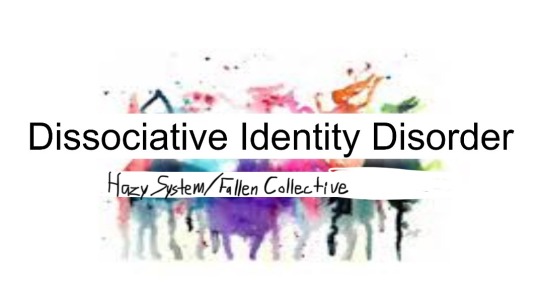
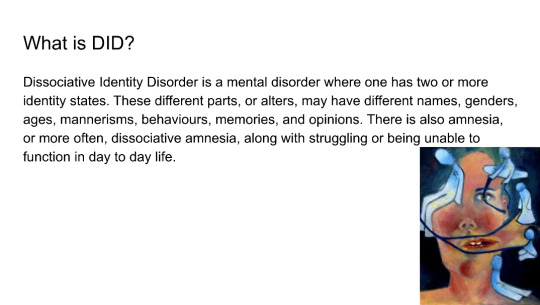
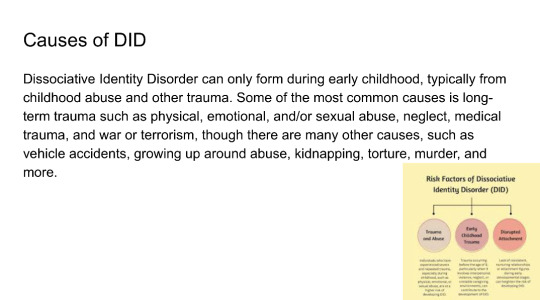
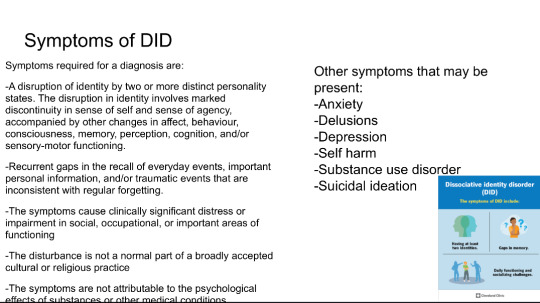
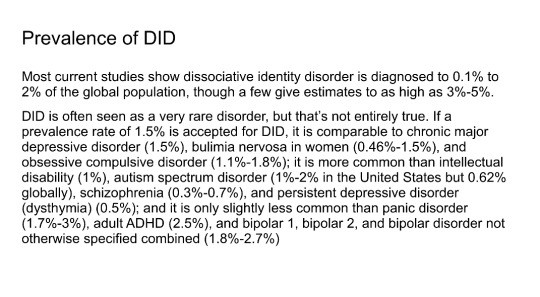
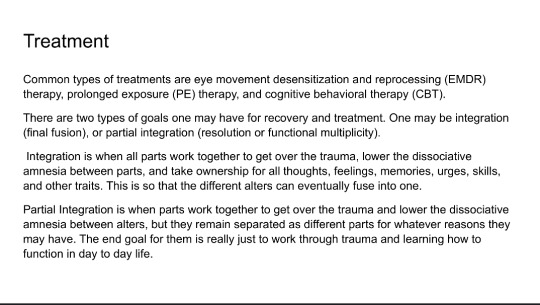
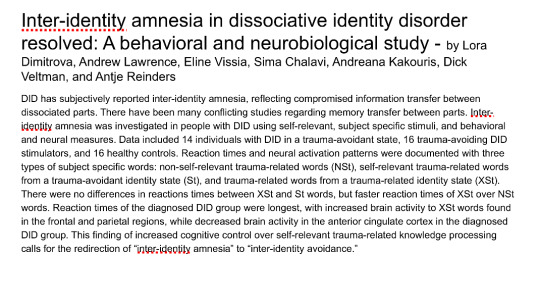
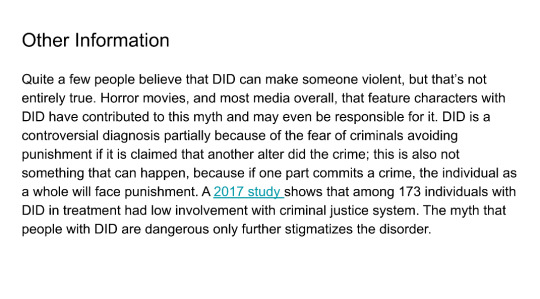
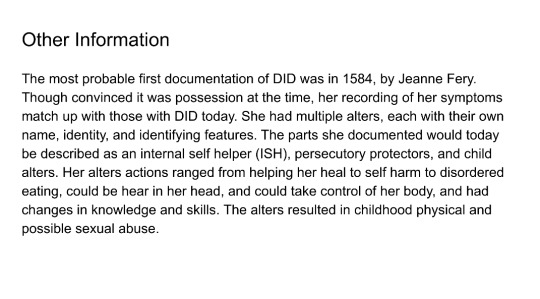
Text in images and resources under cut
Dissociative Identity Disorder
Hazy System / Fallen Collective
What is DID?
Dissociative Identity Disorder is a mental disorder where one has two or more identity states. These different parts, or alters, may have different names, genders, ages, mannerisms, behaviours, memories, and opinions. There is also amnesia, or more often, dissociative amnesia, along with struggling or being unable to function in day to day life.
(A picture of a fragmented person with smaller humanoid figures is in the bottom right corner)
Causes of DID
Dissociative Identity Disorder can only form during early childhood, typically from childhood abuse and other trauma. Some of the most common causes is long-term trauma such as physical, emotional, and/or sexual abuse, neglect, medical trauma, and war or terrorism, though there are many other causes, such as vehicle accidents, growing up around abuse, kidnapping, torture, murder, and more.
(A picture that provides a graph titled: Risk Factors of Dissociative
Identity Disorder (DID) then a circle that says: Trauma and Abuse, below it says: Individuals who have experienced severe and repeated trauma, especially during childhood, such as physical, emotional, or sexual abuse, are at a higher risk of developing DID. A second circle says: Early Childhood Trauma, below it says: Trauma occurring before the age of 9, particularly when it involves interpersonal violence, neglect, or unstable caregiving environments, can contribute to the development of DID. A third circle says: Disrupted Attachment, below it says: Lack of consistent, nurturing relationships or attachment figures during early developmental stages can heighten the risk of developing DID.
Symptoms of DID
Symptoms required for a diagnosis are:
A disruption of identity by two or more distinct personality states. The disruption in identity involves marked discontinuity in sense of self and sense of agency, accompanied by other changes in affect, behaviour, consciousness, memory, perception, cognition, and/or sensory-motor functioning.
Recurrent gaps in the recall of everyday events, important personal information, and/or traumatic events that are inconsistent with regular forgetting.
The symptoms cause clinically significant distress or impairment in social, occupational, or important areas of functioning
The disturbance is not a normal part of a broadly accepted cultural or religious practice
The symptoms are not attributable to the psychological
effecte of cubstances.or other medical conditions
An image in the bottom right corner is titled: Dissociative identity disorder
(DID)
The symptoms of DID include: Having at least two identities. Gaps in memory. Daily functioning and socializing challenges.
And then at the bottom it gives the resource name, Cleveland Clinic
Prevalence of DID
Most current studies show dissociative identity disorder is diagnosed to 0.1% to 2% of the global population, though a few give estimates to as high as 3%-5%.
DID is often seen as a very rare disorder, but that's not entirely true. If a prevalence rate of 1.5% is accepted for DID, it is comparable to chronic major depressive disorder (1.5%), bulimia nervosa in women (0.46%-1.5%), and obsessive compulsive disorder (1.1%-1.8%); it is more common than intellectual disability (1%), autism spectrum disorder (1%-2% in the United States but 0.62% globally), schizophrenia (0.3%-0.7%), and persistent depressive disorder (dysthymia) (0.5%); and it is only slightly less common than panic disorder (1.7%-3%), adult ADHD (2.5%), and bipolar 1, bipolar 2, and bipolar disorder not otherwise specified combined (1.8%-2.7%)
Treatment
Common types of treatments are eye movement desensitization and reprocessing (EMDR) therapy, prolonged exposure (PE) therapy, and cognitive behavioral therapy (CBT).
There are two types of goals one may have for recovery and treatment. One may be integration (final fusion), or partial integration (resolution or functional multiplicity).
Integration is when all parts work together to get over the trauma, lower the dissociative amnesia between parts, and take ownership for all thoughts, feelings, memories, urges, skills, and other traits. This is so that the different alters can eventually fuse into one.
Partial Integration is when parts work together to get over the trauma and lower the dissociative amnesia between alters, but they remain separated as different parts for whatever reasons they may have. The end goal for them is really just to work through trauma and learning how to function in day to day life.
Inter-identity amnesia in dissociative identity disorder resolved: A behavioral and neurobiological study - by Lora Dimitrova, Andrew Lawrence, Eline Vissia, Sima Chalavi, Andreana Kakouris, Dick Veltman, and Antje Reinders
DID has subjectively reported inter-identity amnesia, reflecting compromised information transfer between dissociated parts. There have been many conflicting studies regarding memory transfer between parts. Inter-identity amnesia was investigated in people with DID using self-relevant, subject specific stimuli, and behavioral and neural measures. Data included 14 individuals with DID in a trauma-avoidant state, 16 trauma-avoiding DID stimulators, and 16 healthy controls. Reaction times and neural activation patterns were documented with three types of subject specific words: non-self-relevant trauma-related words (NSt), self-relevant trauma-related words from a trauma-avoidant identity state (St), and trauma-related words from a trauma-related identity state (St).
There were no differences in reactions times between XSt and St words, but faster reaction times of XSt over NSt words. Reaction times of the diagnosed DID group were longest, with increased brain activity to XSt words found in the frontal and parietal regions, while decreased brain activity in the anterior cingulate cortex in the diagnosed DID group. This finding of increased cognitive control over self-relevant trauma-related knowledge processing calls for the redirection of "inter-identity amnesia" to "inter-identity avoidance."
Other Information
Quite a few people believe that DID can make someone violent, but that's not entirely true. Horror movies, and most media overall, that feature characters with DID have contributed to this myth and may even be responsible for it. DID is a controversial diagnosis partially because of the fear of criminals avoiding punishment if it is claimed that another alter did the crime; this is also not something that can happen, because if one part commits a crime, the individual as a whole will face punishment. A 2017 study shows that among 173 individuals with DID in treatment had low involvement with criminal justice system. The myth that people with DID are dangerous only further stigmatizes the disorder.
Other Information
The most probable first documentation of DID was in 1584, by Jeanne Fery.
Though convinced it was possession at the time, her recording of her symptoms match up with those with DID today. She had multiple alters, each with their own name, identity, and identifying features. The parts she documented would today be described as an internal self helper (ISH), persecutory protectors, and child alters. Her alters actions ranged from helping her heal to self harm to disordered eating, could be hear in her head, and could take control of her body, and had changes in knowledge and skills. The alters resulted in childhood physical and possible sexual abuse.
Resources: https://my.clevelandclinic.org/health/diseases/9792-dissociative-identity-disorder-multiple-personality-disorder
#long post#did#dissociative identity disorder#dissociative disorder#cdd#complex dissociative disorder#did info#did information#dissociative identity disorder info#endos dni
10 notes
·
View notes
Note
Do you have any extra information or resources on paranoid personality disorder or? I've been looking for it myself.
You can check this link out, it also shows the criteria for PPD, as well as showing common comorbidities, differentials in some of the other personality disorders, and the difference between delusional disorder/schizophrenia/bipolar/depression with psychotic features (although it does fail to mention PPD can cause psychotic episodes itself, it just isn't a constant thing since it's not a psychotic disorder). However, ignore the 'treatment of PPD' section: I do not like how it says PPD hasn't been proven to be able to be effectively treated, which is blatant misinformation, at best. It only lists Cognitive Behavior Therapy (CBT) and medication to help with it, and while those do/can help, it's far from the only things. Most cases of PPD stem from trauma of some kind, so you have to get specialized trauma therapy to help with it, including things like: 1. Eye Movement Desensitization and Reprocessing (EMDR) 2. Somatic Therapy 3. Narrative Exposure Therapy (NET) 4. Hypnotherapy 5. Cognitive Processing Therapy (CPT) You can learn more about trauma and the types of trauma-centered therapies here (I don't enjoy the very distracting giant scrolling logo in the center of the page, but I digress...) Not all kinds of therapy will be effective, and some might even be straight up dangerous to pursue. Everyone is different, and it's up to the individual and their mental healthcare provider[s] to decide what will work for them. You could also pursue Dialectical Behavior Therapy (DBT), but not in the beginning of therapy. That, in my opinion (and from personal attempted experience), is 'later stage' therapy. You need to be in a somewhat good state of mind to start that, otherwise it's just really frustrating and makes you mad at/with yourself.
I hate to be someone who thinks their tumblr blog is a good source of information (even if it probably is, to an extent?) being that I'm not a professional... but I do try and link sources in some posts and answered asks. Resources are really hard to find, since there's not much research going into this disorder (or at least, that's what it seems like). With that being said, I'll link you to some of my posts that might also be helpful, with most having links to information and resources relating to the post topic: 1. Differences between anxiety, paranoia, trust issues, and overthinking 2. Helping someone who is experiencing paranoid delusions 3. Cluster B overlapping symptoms (maybe I should get around to doing overlapping symptoms for the other Cluster A disorders and Cluster C...)
Let me know if you need anything specific, I will try my best to look for resources for you! -Mod Clemont
#ask#birdbombs714#not a suggestion#long post#resources#ppd#paranoid personality disorder#paranoia#actuallyparanoid#actually paranoid
5 notes
·
View notes
Text
EMDR Therapy: Shedding Light on Its Effectiveness in Treating PTSD
EMDR Therapy: Shedding Light on Its Effectiveness in Treating PTSD
Eye Movement Desensitization and Reprocessing (EMDR) is a transformative approach to psychotherapy that enables people to heal from the symptoms and emotional distress resulting from disturbing life experiences. Unlike traditional therapies, EMDR therapy for PTSD utilizes the patient's rhythmic eye movements to dampen the power of emotionally charged memories of past traumatic events.

Understanding How EMDR Works
EMDR therapy integrates several practical elements of other therapeutic approaches with eye movements or other forms of rhythmic, left-right stimulation, such as sounds or taps. During EMDR eye movement therapy, the patient recalls a traumatic event while the therapist directs their eye movements back and forth across their field of vision. This process is believed to work by "unfreezing" the brain's information processing system, which is interrupted during extreme stress.
The Effectiveness of EMDR
Clinical Success and Studies
Research overwhelmingly supports the effectiveness of EMDR therapy in treating PTSD. Several controlled trials have shown that EMDR eye movement therapy effectively decreases the symptoms of PTSD, including flashbacks, nightmares, and anxiety. Patients often report a decrease in emotional distress and an increased sense of mental stability.
Beyond Trauma
Eye Movement Desensitization and Reprocessing (EMDR) is also versatile, proving beneficial for various issues, including anxiety, depression, and panic disorders. This adaptability makes EMDR an invaluable tool in the mental health toolkit.
Phases of EMDR Therapy
EMDR treatment typically involves eight phases, focusing on memories, present disturbance, and future actions. The goal is to ultimately process the experiences causing problems and include new ones needed for total health. "Processing" does not mean talking about it; it means setting up a learning state that will allow experiences causing problems to be "digested" and stored appropriately.
The Patient's Experience
Initial Consultation
Each EMDR session begins with an initial review of the patient's emotional health, which helps to tailor the therapy to the individual's needs. The therapist prepares the patient by teaching techniques to handle emotional distress.
The Processing
During therapy, focus is placed on specific traumatic events. Patients are guided to recall these events along with the associated images, thoughts, emotions, and physical sensations. The therapist then directs the patient to make eye movements or other bilateral stimulations to help process these memories.
Closure
Sessions conclude with the therapist instructing the patient on how to maintain a log of any related thoughts or emotions that arise between sessions. This log helps patients apply the calming techniques learned in therapy to real-world situations.
Well Health Counselling For Your Needs
At Well Health Counselling, they understand the profound impact that trauma can have on an individual's life. Their EMDR therapy sessions are designed to provide clients with a safe, confidential, and supportive environment. With a team of specialized therapists, Well Health Counselling uses EMDR to facilitate the brain's natural healing processes, helping clients overcome trauma and regain control of their lives. Their commitment to providing accessible and effective treatment makes them a beacon of hope for many suffering from PTSD and other trauma-related issues.
In conclusion, EMDR therapy offers a promising avenue for those seeking to overcome the debilitating effects of PTSD. With its unique approach to processing traumatic memories through eye movement desensitization therapy, EMDR has opened a new frontier in psychotherapy that promises not just to manage symptoms but to heal the underlying psychological distress.
For More: - www.wellhealthcounselling.com/emdr-therapy
#emdr eye movement therapy#eye movement desensitization therapy#emdr therapy for ptsd#eye movement desensitization reprocessing
0 notes
Text
Squeaked in at the last minute for Day 6 of @gwynweekofficial!
Here's the first chapter of a modern Gwynriel grad student AU. Read below the cut or on ao3!

Dark Matter
CW: referenced sexual assault, language, Nesta smoking weed lol
The effects of lucid dreaming on PTSD-related nightmares (as well as waking symptoms) have been discussed in several studies collecting anecdotal data from amateur practitioners (Gibbons et al, 2016). Further research has been conducted on brain activity during lucid dreaming as well as PTSD-related nightmares. Both phenomena demonstrate brain activity in the amygdala, where the brain stores emotional memory (CITATION), and lucid dreaming introduces activity in the prefrontal cortex often absent during nervous system dysregulation (THAT ARTICLE I CANT FUCKING FIND REMEMBER TO ASK ANAKE).
Traumatic memory reconsolidation through techniques such as eye-movement desensitization and reprocessing (EMDR) indicate therapeutic value in ‘re-living’ traumatic experiences in formats that promote autonomy and agency for the victimized person (CITATION) (IS THIS LANGUAGE RIGHT?). Preliminary data using the Nightmare Protocol (Rothschild, 2000) in closed lab conditions show a decrease in symptoms of hypervigilance, waking flashbacks, and PTSD-related nightmares (Merrill & Berdara, 2023). This study will explore the possible link and therapeutic benefits of
“Think fast, bitch.”
Gwyn looked up from where she’d been typing feverishly, blinking at her friend who was looming over her on the sofa, waggling a fuzzy blanket and an unlabeled prescription bottle stuffed with weed. Nesta sat down next to her so their thighs were touching and wrapped the blanket around them both without asking, blocking out the chill of the A/C blasting full throttle.
Yet despite the sigh that escaped her, Gwyn knew Nesta didn’t need to ask - this was exactly what she’d come over for, whether she regretted the request or not.
“I texted Cass to see what his plans are, I’ll let you know when I hear from him,” Nesta said. Her voice was sharp, articulate, and it always reminded Gwyn of the ladies from period dramas, though there was nothing demure and blushing about her. Nothing but fierce determination in the woman who lifted the laptop from her hands and scooted it out of reach before grabbing the rolling papers from the coffee table drawer. Nesta rolled a neat joint with the same dedication as she did all her cases, the same way she’d taken Gwyn under her wing all those years ago.
They’d met in a class called Children of Divorce, which turned out to be more boring than depressing, but the two had formed a quick bond bitching about the dumbass professor, the limits of academia in general.
Nesta had been very protective of her from the start, which had confused Gwyn at first, but she’d come to accept the stubbornness of her friend’s care, the deep privilege of having someone so loyal on her side. Along with their friend Emerie, Gwyn had never felt more solid in her relationships, more held and loved by the people in her life.
Which was fortunate giving what a fucking train wreck that life had become in the past year.
Gwyn heard the front door open, a tired grunt and the sound of a heavy bag being dropped on the floor. She felt her shoulders tense reflexively and tried to relax them, picturing the sparkling blue of the bay where she’d vacationed as a child.
“Hi baby,” Nesta called from the couch. “Gwyn’s here.”
She grabbed the laptop and typed something quickly before setting it aside, tilted toward Gwyn, and heading into the kitchen. Gwyn saw the Google search bar on the screen, the words entered there: do you need him to find somewhere else to be?
Her heart swelled at her friend’s kindness, her consideration. Nesta had been so good from the very beginning at helping Gwyn feel comfortable without making a big deal about it. She half-listened to the couple greet each other, unable to help the small smile that rose to her lips.
“How was training?”
“Awful. I’m slow as shit right now.”
If Nesta’s ferocity was clear when she spoke, Cassian’s overall bigness was evident in his voice, the happy boom of it reverberating like the subwoofers they used to dance on top of at house parties in undergrad. They’d gotten a lot closer this summer given how much time she spent at their townhouse, and Gwyn felt lucky to call him a friend even though she was still uneasy around men.
“You should run with Az again. Last time you were so mad he was faster, you got better out of spite.”
“Oh my god, why did you tell me that? That’s exactly what I have to do. You’re so smart.”
Gwyn heard the sound of Cassian kissing his wife’s cheek, her answering noise of disgust.
“And you smell horrible.”
“Yeah I’m gonna go shower, my running rival is coming to pick me up in a bit.”
Nesta appeared back in the living room, pointed her thumb down and then up - a question. Gwyn returned a thumbs up, and Nesta smiled.
“Why don’t you hang out here?” she called back into the kitchen, and Gwyn heard cabinets opening, the rush of water in the sink.
“Is that cool with you guys?”
“I told Gwyn all I wanted to do was get high and eat Thai and watch Love is Blind. So if that’s your pleasure, feel free.”
Cassian appeared around the corner with a big cup of water, the plastic splashed with an image of Nesta’s face twisted in fury, a souvenir of his bachelor party. He grinned at Gwyn, his gym clothes and swept back hair damp with sweat. “I’ll text Az. We were gonna get food I think, but maybe we’ll come back after,” he said before disappearing to the bedroom, and she heard the shower starting, the whoosh of the pipes in the wall.
Nesta was already nestled into the couch when Gywn came back to herself, remote held aloft, drawing long from the joint she’d left smoldering in the ashtray. She held it out across the sofa but Gwyn shook her head, diving back into her literature review instead, for as long as Nesta would allow, anyway.
Not that she was above smoking, but it made her paranoid and jumpy, didn’t give her the mellow feeling she craved. Gwyn had tried everything and anything to help her sleep by this point, though her darkest hours were still plagued with dreams of cramped elevators, wine-stained lips, the cold click of wheels across hospital floor tiles. During the disciplinary hearing, she’d gobbled Xanax like Emerie’s dog devoured any food left unattended. She’d even tried going to church a few times, though the looming figures on the altar felt like they grew bigger and bigger with each breath she dragged into her lungs, her florid prayers condensing into a desperate mantra of Please don’t do this, please don’t, please, please, please..
Those days were behind her, thankfully, though the scars still lingered, both within and without. Gwyn vaguely heard Cassian calling out his goodbyes, waved an idle hand over her shoulder in his general direction.
Things were looking up recently, the slow plod of time eroding the sharp crags of her memory. Since the hearing in May she’d had three blissful months of a deserted campus to get back into a routine, to start scraping together a sense of normalcy. But now the undergrads were back for the semester, as well as her.. well, she didn’t know what to call Him anymore.
Former advisor, erstwhile lover.
Executioner.
His face flashed in her mind, a pastiche of all the times he’d praised her, poured the balm of his attention over her neglected heart. The hard set of his jaw across the conference table, the drunken fury when he’d -
“Oh, what the fuck?” Nesta yelled at the TV, jolting Gwyn from where she’d paused in her typing mid-sentence. “You’re gonna propose and then talk shit about her behind her back? Men are trash.”
The show was garbage, ten thousand percent so, but as her mind slowed down from its frantic rememberings Gwyn could admit to herself that she needed this. Just as she needed Nesta’s arm to reach out then and wrap around her shoulders, encouraging her to sink further into the corner of the threadbare couch, snuggled once more under the giant blanket.
It was a testament to Nesta’s goodness that she hadn’t hesitated to invite Gwyn over when she called her this afternoon mid-panic attack, hadn’t made the slightest fuss when she could only choke out I saw Him before dropping the depositions she’d been reviewing and plunking her friend on the sofa.
“He’s growing out his beard again.”
It felt like a stab wound, knowing he was out there still, carrying on while she was a fucking wreck. Gwyn was despondent as she gave up and finally shut her laptop, setting it on the side table. It felt like every time she got her feet under her something would sweep them away, leaving her bruised once more.
“What an asshole.” Nesta’s scowl could stop a man’s heart. “At least it makes him look like the fucking groomer he is.”
All the breath had left her when Gwyn saw Him across the quad that morning - he’d been talking to a very young student, the tiny cherries on her sundress like drops of blood.
“I should transfer.”
“Fuck that. You deserve to be here. You deserve to finish your education.”
She didn’t protest, knowing arguing with Nesta was useless anyway. Instead she rested her head on Nesta’s shoulder, heard the hum of approval as her friend took another long drag, blowing out a dense cloud of smoke. Gwyn felt her phone vibrate and patted around on the cushions for a second before finding it.
Emerie: love you Winnie, i have my phone on for a client anyway so you’re not allowed to feel guilty for calling me
Catrin: Hey I have time this weekend if you want to facetime!! Noon my time/midnight yours?
Cassian: Gwynnie do you want food? Nes is demanding Thai, but we can drop it off if you need some space
Gwyn: No you’re fine, I don’t want to kick you out of your own house
Cassian: shut up
Cassian: Az said he wants to see you if that changes your mind
Cassian: 😏
Gwyn declined to respond to his last message, unsure what the hell to even say to that. The thought of a guy even looking at her was enough to make her skin crawl these days, but beneath it now there was a tiny thrill, a part of her that came back online. She puzzled over it through the next episode before Cassian burst through the front door once more, his crooning call accompanied by the rustle of plastic bags.
“Oh, love of my life!”
The wedding was a requirement to move in together, given Nesta’s family’s conservative leanings, and everyone looked at each other sideways when the two got married right after undergrad considering their litany of very public breakups and makeups. But Cassian and Nesta were the most solid couple she knew, and they both seemed to delight in collecting waywards souls and stuffing them full of food and aggressive affirmations.
That truth was evidenced by the mountain of sweets Cassian poured out onto the couch from a CVS bag, the mile-long receipt fluttering to the floor. “We didn’t know what you’d want so we got everything,” he said before burying his face in Nesta’s neck. “I missed you.”
“You saw me forty-five minutes ago,” she groused despite her smug expression, and she allowed her husband to deliver her pad thai on one knee, cracking the plastic container open and revealing the noodles with all the flourish he would a diamond ring.
Azriel, for his part, had enough decency to look embarrassed by the whole thing, and Gwyn couldn’t help smiling at the way he rolled his eyes and sloped into the kitchen to grab a beer for himself and Cassian. He gave Gwyn a questioning look and she shook her head, tried to ignore the flush that threatened to stain her cheeks.
It hurt sometimes to see how in love her friends were.
She’d been in love with Him, at least she’d thought so at the time, though now she could only view the memories through the stain of the aftermath. He was married, and thirty years her senior, but he made her feel special, as pathetic as that made her sound in her own head. The world wouldn’t understand, he told her, and she’d believed him even as the guilt ripped at her, the sense that at its base what they were doing was deeply wrong.
She wished she could say her conscience caused her to break it off, but it had taken the threat of his wife discovering them to make her end things for good. She’d been unable to hide her heartbreak, and confessing the relationship to her friends was horrible. Gwyn expected them to blame her, to tell her she was asking for it. That she knew better than getting involved with a married man, that she was a homewrecker, a whore, the thousand slurs she hurled at herself every day.
But once the initial shock wore off, her friends’ sorrow surprised her, as did the rage they felt toward Him. Emerie, in her gentle but no-nonsense way, taught Gwyn a lot about abusive relationship cycles and coercive control, and she began to comb through the illusions he’d weaved through the cracks of her fragile sense of self.
But only after she’d untangled herself from Him did the worst of it happen. Now she could barely think his name without starting to tremble.
Too late she registered the people on TV were no longer making sound, the turn of eyes toward her. Gwyn didn’t even realize she was crying until she felt Nesta’s hand tightening around her own.
“Oh honey. Oh, it’s okay, come here.”
She felt Nesta’s arms wrap around her shoulders, her now-heaving breaths shaking them both.
“I’m sorry.’ The shame lay thickly on top of her, paralyzing. Nesta only squeezed tighter, trying to ground her.
“Shut the hell up, I love you. You’re allowed to feel like this.”
From the corner of her eye she saw Cassian shift slowly, picking up her water bottle and setting it beside her. Gwyn clutched the handle like it was a life raft.
“I just don’t think I can stay here much longer,” she choked through her tears, mortified that the mess was showing on the outside. “I can’t keep getting knocked over every time I see Him.”
Azriel’s fist clenched against the sofa arm but he was otherwise still, an unreadable expression on his face. Then his eyebrows softened and Gwyn heard the rush of her own blood in her ears, the fear pounding.
“I’m so tired,” she blurted out, unable to contain it. Everyone kept silent, letting the tide flow out of her. “I’m on edge all the time, I can’t concentrate. Merrill is breathing down my fucking neck. And it’s clear he isn’t going to leave, so if I want any peace of mind I have to leave myself.”
“You know what’s best for you better than anyone else,” Azriel said quietly. “But I also think you’re trying hard not to take the help that would be happily given to you.”
“What do you mean?”
“You say you’re tired. So let the people who love you take some of the weight.”
Nesta made a noise of agreement, and Gwyn turned to her, taken aback.
“You agree with him?”
Nesta shrugged and brushed Gwyn’s hair back from her face, reached around her to pluck a tissue from the box on the end table, a remnant of her last breakdown. “I mean, you always act like the things I do for you are such an inconvenience for me. They’re not. I’d do literally anything for you.”
“Why?”
“Because you deserve it.” Cassian’s stare was even from where he was sprawled on the floor, and even as the guilt twisted in her stomach Gwyn felt the truth of it, of the way they were all holding her up.
“What would it even look like?” They’d been so constant, and she promised herself to consider the help for their sakes, even though she knew she’d never accept.
Cassian shrugged. “However you want. You can move in here if you don’t want to live alone.”
“No, I’m not getting in your way like that.”
“I’ll move in with you, then.”
“Nesta, no.”
“I could escort you on campus if that would help,” Azriel offered.
Gwyn faltered, both from surprise at his willingness and because it actually sounded great. “I’ll be running my sleep study the next few weeks, my hours are too weird.”
“Az is pretty much nocturnal, he’s perfect for the job.” Cassian reached up and ruffled his friend’s hair, leaving Azriel looking like a disheveled crow. He scowled but turned back to Gwyn, his deep voice sincere.
“If it’s because you’re uncomfortable with it, that’s fine.”
“But if you’re saying no because you’re stubborn,” Nesta added. “Then you’re outnumbered here, babe.”
Cassian began a chant of One of us, banging his hands on the coffee table, and Gwyn laughed in spite of herself, tears still leaking. “I don’t want to be handled like I’m something fragile.”
“No, no.” He paused his banging and looked thoughtful, considering. “Think of us like the Secret Service. We got your back so you can focus on saving the world.”
“I think I should talk with Amelia about this.” Her therapist was good at giving it to her straight while still empowering her to trust her instincts.
“Okay, I’m gonna hold you to that,” Nesta said sternly before wrapping Gwyn up again. “Lovingly, tenderly hold you.”
“I don’t know why you’re being so nice to me.”
“Because you do too much for other people to carry this shit alone. Because there are people in the world who want nothing more than to bring you Belgian chocolates,” Nesta said, picking up a box from the pile on the sofa and waving it in front of her face. Azriel’s eyes darted toward the carpet. “Don’t let one fucking horrid asshole man take that from you. Now are you going to help me verbally abuse these trash bags or not?”
Gwyn laughed again, the knot in her throat easing as Nesta unmuted the TV and the others settled back into their places, the bounce of conversation returning once more.
“What’s wrong with this lady? What does she have?”
“I can’t diagnose anybody,” Gwyn said offhandedly, the answer rote as she dug through the chocolates. “Sorry, I’m overwhelmed by choice at the moment.” She puzzled over the map on the inside of the box lid, the whirl of vague descriptors about the chocolates’ depth, the passion of their creation. “I don’t think I can start with one of the ‘intense’ ones, they’re too intimidating. Like, intense compared to what? How do I prepare for that?”
Cassian tipped his head back and laughed. “See, if you were gone, who else would say shit like that? You make the world better, Gwynnie.”
And damn it if Gwyn didn’t feel herself begin to unspool as they watched, the idle commentary warming her through. Eventually a very stoned Nesta started using her experience in divorce settlements to determine which couples were the real deal and which were goners, and apparently the overall odds were grim.
“No, see, they disagree about lifestyle priorities. They’re fucked.”
“How can you tell?” Azriel frowned, and Gwyn couldn’t help watching the shift of his long legs, clad in black jeans despite the August heat.
“Look at the way he’s dismissing her. He’s gonna be like ‘oh I’ll convince her I’m right, she’ll agree with me eventually’.”
The contestant in question appeared in a confessional and said the same thing Nesta predicted, nearly verbatim. Cassian shuddered.
“That’s spooky. You terrify me.”
“Good.”
Gwyn smiled as Nesta grabbed Cassian’s neck playfully from behind, putting him in a headlock. She glanced at the sun setting beyond the balcony, orange streaking the sky. “I feel like we are going to see him eat those words. AND I’m going to check that all the doors are locked because it will make me feel better.”
Weeks ago after a similar meltdown, Gwyn had promised her friends to be more unapologetic about the things she needed to do to feel safe since the assault. Eventually she’d learn to let the security blankets go, but she needed them right now and that was okay.
So it was with a feeling of lightness that she popped up from the sofa, that she heard Cassian say, “Yes queen,” through a mouthful of drunken noodles at the same time Nesta assured her, “Do whatever you need to, babe.”
It wasn’t always simple and it was difficult not to let the hard days win, but her friends had been awesome. Including, surprisingly, the brooding guy settled back into the far corner of the couch.
Azriel.
What the hell was she going to do about him? She’d only known him as Cassian’s friend before her world explored, was shocked a few days after when he visited her in the hospital. He’d brought her socks, saying he knew hospitals could be cold. It was sweet, and she’d held the memory close in those dark days that followed, a small spark in the blackness.
She locked the back door, rotating the handle twice. She did the same to the front door, and was halfway down the basement stairs when Azriel started up, meeting her on the landing in the middle.
“I got the sliding door,” he said.
Gwyn flushed with anxiety, felt her eyes burn with inevitable tears. “I need to check myself.”
“Of course. I’m sorry.”
She brushed past him and checked the door, made sure the bar was down and the pin in place. Rattled it twice. Azriel was hovering at the bottom of the stairs when she turned, hunched like he wanted to make his lanky frame smaller. She swallowed as she started to cry, trying to keep down her shame at her body’s natural reaction.
It was normal. She was okay.
“I’m not crying because I’m upset. I’m crying because you wanted to help me and that’s just really nice of you.”
“Gwyn, I-”
“Thank you. It really means a lot to me.”
His skin was cool when she laid her hand over the tattoo on his forearm, the swirl of geometric shapes wrapped around it. Sacred geometry, he’d told her once, the ‘tree of life’. Before her now he stayed deathly still, as if not wanting to startle her, though his shadowed eyes didn’t stray from her face.
“Look, I don’t want to make you uncomfortable. But.” He seemed to think hard on his words. “I care. About you.”
He placed a hand over hers, and for the first time in forever Gwyn didn’t feel tired to the center of her bones, didn’t feel like a damaged, fucked up cast-off too weak to survive in the world. She felt like just a girl, standing in front of a boy, trying to remember how to breathe because he was really, really unfortunately good-looking.
“Did you mean to abandon us up here?”
Cassian’s voice resonated from the living room, making Gwyn jump, her gaze snapping toward the stairs before Nesta said, “That’s so rude, you know we both have abandonment issues.”
She heard Cassian’s booming laugh and turned back to Azriel, who looked chagrined and yet nervous somehow, like his face couldn’t decide how much it wanted to show. She wiggled her toes against the concrete, grounding herself with the fuzzy fabric of her socks, the first thing that ever helped.
“I was just saving Azriel from a robber,” she called up the stairs. “Poor thing, I think he needs an escort on campus at night.”
She felt some of her old self resurface as she smiled at him then, at the way he’d half-frozen in surprise before his mouth curled into a lazy smirk.
“Guess I’ll be seeing more of you, Berdara.”
#gwyneth berdara#gwynweekofficial#gwynriel#gwyn x azriel#pro gwynriel#nesta archeron#cassian#modern!gwynriel
21 notes
·
View notes